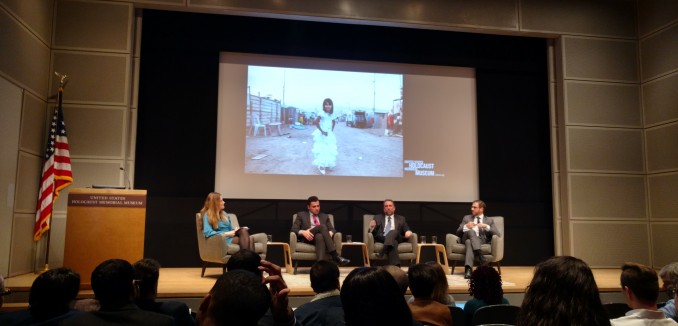Five years into the Syrian civil war, Qutaiba Idlbi, a native of Damascus, recalled a question he first heard at the onset of the revolution.
“Why should we go out to the streets if we know that Assad is going to shoot unarmed people?”
Idlbi remembered that question, raised by an opposition activist after the regime of Syrian President Bashar al-Assad began cracking down on the protests that swept the country in March 2011, as well as he did his own confident response.
“Because the international community is not going to allow Assad to do that. No one in the world is going to just watch while Assad is killing people.”
Speaking at the U.S. Holocaust Memorial Museum on Tuesday after half a decade of bloodshed in Syria, which left over 250,000 dead and millions displaced, Idlbi now says his reply may have been naïve.
While a fragile ceasefire was reached by world powers last month, and Moscow announced on Monday the end of its Syrian airstrike campaign (which human rights groups claim killed hundreds of civilians), Idlbi says the country remains in the grip of despair.
“Right now we got to a critical moment where actually all Syrians inside believe there is a conspiracy against them, no one wants them to get freedom, no one wants them to build a new country, no one wants Assad to step down,” he said. These ideas, stoked by the limited support Western nations have extended to the revolution, are pushing people to embrace extremist ideologies. “We are at this moment where Syrians really are looking for any hope,” he explained.
Robert Satloff, executive director of The Washington Institute for Near East Policy, seemed similarly concerned by the West’s inaction in Syria, a conflict he described as “carnage 24/7.”
“Somehow, in our political culture today, it became not an act of shame, but perversely an act of great moral courage not to act in Syria,” he observed. “If you read statements by our political leaders, somehow the greatest achievement of the last half dozen years, a great act of political courage, was to withstand the consensus and not to act to save hundreds of thousands of people. This is perverse.”
Yet what seemed to most confound Satloff, Idlbi, and the range of Syrian activists present at the talk was how the United States could remain so detached from a conflict where its strategic interests and humanitarian concerns are directly aligned.
“We should be much more actively engaged in Syria not just because it’s the right thing to do, but because it’s the smart thing to do,” Satloff stressed, pointing to the consequences of American inactivity in Syria, particularly the projection of power by Russia and Iran.
“The Iranians have come in, in a much more assertive way of projecting their own force and projecting that of their allies, taking them to the Mediterranean,” he said. “So now the Iranians are critical actors and power brokers from Lebanon through Syria through Iraq to Iran. That’s an entire northern tier of the Middle East in which the Iranians play a major role.” Satloff also noted that the Islamic State has continued to expand its territory despite Russian airstrikes, which Moscow alleged targeted the terrorist group.
“The Russians didn’t do anything about ISIS. The Russians went in to help Assad,” he asserted. “They’re leaving, and ISIS is still in control of at least around half the country.”
Idlib, like several other Syrian activists present at the talk, was eager to see the United States seize this opportunity to protect civilian lives, namely by the establishment of no-fly zones where Syrians could find refuge from the regime.
“The minimum [the U.S.] should be doing here is actually acting out to protect civilians, to have areas where Syrians can go home safely and not have aerial bombing and shelling,” he argued. Syrian want a “peace where [the] Assad government will not be able to hunt us one by one from our homes because we participated in the revolution, because we stood up and said no.”
His message didn’t fall on deaf ears.
“I am open to a no-fly zone in Syria, aimed at hampering the Assad regime’s air-power,” Rep. Eliot Engel (D-N.Y.), the top Democrat on the House Foreign Affairs Committee, told the audience shortly after Idlib and his fellow panelists left the stage to wide applause.
Calling the Syrian crisis a “tragedy in our lifetime,” Engel said he believes that Washington’s failure to aid Syrian rebels was a “mistake,” though having never gone in that direction, it was impossible to know for certain. One thing was clear, however.
“If it hadn’t been for Russian intervention or the intervention of Hezbollah, which is an Iranian proxy and a terrorist organization, Assad would not be where he is today,” Engel noted, and pointed to a non-binding measure that the House of Representatives overwhelmingly passed on Monday in an effort to hold Assad accountable. The resolution calls for the establishment of a war crime tribunal to address violations by Syria, Russia, Iran, and Hezbollah.
Whether or not the resolution will succeed in its stated aims, it reflects a certain bipartisan consensus on the crisis in Congress. Foreign Affairs Committee chairman Rep. Ed Royce (R-Calif.), who addressed the crowd after Engel, echoed his colleague’s conviction.
“We will not accept these terrible atrocities,” he emphasized, “either by Assad or by Daesh.”
[Photo: Shiri Moshe / The Tower]




